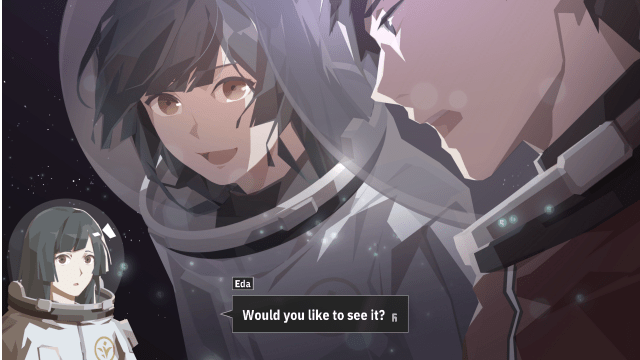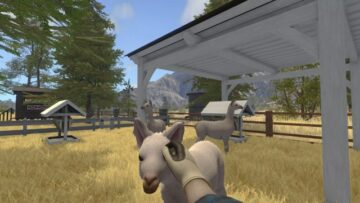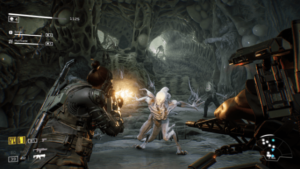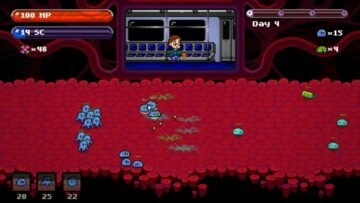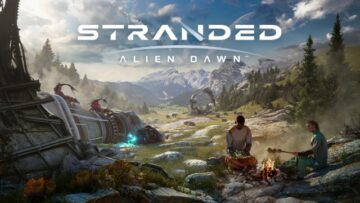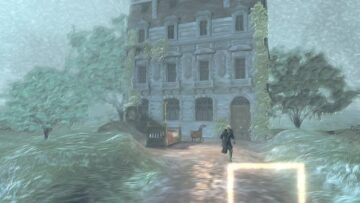How much would you sacrifice for the people you love? Of the many narrative threads that OPUS: Echo of Starsong – Full Bloom Edition’s weaves with, it’s the one that keeps getting returned to. If those loved ones seem lost, when would you give up? Would you give up? And, if they were gone forever, would you trade the rest of your life for a few snatched moments with them?
OPUS: Echo of Starsong – Full Bloom Edition is not a game to play if you want to keep your hankie dry. It’s a game that played us like an instrument, knowing every string to pluck or valve to press. We were haggard by the end of it, and it’s testament to the designers and writers that at no point did we feel emotionally manipulated. This is every bit as authentic and wonderful an experience as To The Moon, What Remains of Edith Finch, and other narrative tearjerkers.
Explaining what OPUS: Echo of Starsong – Full Bloom Edition is is something of a challenge. We haven’t encountered games like it. You could reduce it and call it a visual novel. There is certainly plenty of reading, with every aspect of the game requiring you to get to grips with text. There are moments on your ship, chatting with your crew, that most resemble a visual novel, but then you’re also out in the field, exploring stations and moons on foot in two-and-a-half dimensions. It’s too interactive, too eager to let you explore to truly be a visual novel.
At other points, it feels like a game centred on the codices from games like Dragon Age. Your knowledge of the universe and its history is scratched together from found items and artefacts. One of the most haunting and successful elements of OPUS: Echo of Starsong – Full Bloom Edition is that everyone seems enthralled with the past, to the point that people are sleepwalking into the future. It gives the universe a sense of entropy, a diminishing, as people cling to what was once important.
And then there’s the starmap navigation, which recalls – of all things – the mining sections in Mass Effect 2. The universe is presented as a zoomed out map, but that map is astonishingly dense. Virtually every dot on the map is a location to be explored, whether abandoned or inhabited, and you are at the whims of what lies there. Events pop up, offering choices that might lead to a dice roll (modified by the items and events that you have previously experienced), or simple dialogue choices. Other times, you can use up stored exploration kits to return with salvage, which in turn can be converted into cash or upgrades for your ship. Build those upgrades, and you may find yourself better positioned to explore the starmap. Longer journeys, better protection against enemies, and greater capacity for exploration are all possible.
Above all, OPUS: Echo of Starsong – Full Bloom Edition is an accumulation of all these things, interweaving perfectly to create an experience that – if we were to compare it to anything – most resembles Heaven’s Vault. Inkle’s masterpiece shares OPUS’s pervasive sense of loss, and a world as a palimpsest, desperately trying to find its own identity even though its foundations are in the past. Though they are very different games, we would suggest that fans of one should search out the other.
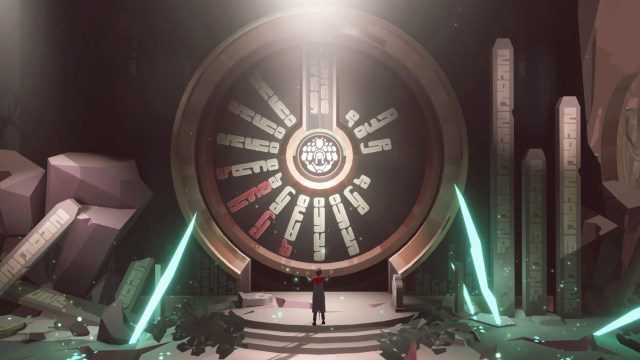
Because OPUS: Echo of Starsong – Full Bloom Edition is a masterpiece in its own right. Every bit the 5 out of 5, OPUS had us sifting through and lingering on every text fragment it gave us, putting together its histories. We were thoroughly smitten.
It’s big-hearted, and that comes from the relationships that anchor the story. It’s the story of Jun and Eda, who take turns at being the centre of the narrative. Eda is a witch, although not officially – she never passed the exams that enshrined her as one. But this isn’t the pointy-hatted interpretation of the term: she is more of a space-siren, able to hear and interpret starsong, and then sing it back to open various gates that are strewn about the universe. These have been forgotten, the casualties of a war that obliterated virtually everything.
Jun, meanwhile, is a noble who has effectively been exiled by his clan, East Ocean, for a past mistake. He is shadowed by Kay, an older bodyguard who has followed him into banishment. Jun is desperate to find abandoned lumen caves, claim them in the name of East Ocean, and return as a hero.
Early on, the paths of these two characters cross, and an uneasy alliance is forged on Eda’s ship. Eda’s other crewmate, Remi, is extremely wary of Jun, and there’s the sense that things are frothing up to a critical moment. Are Eda and Jun going to fall in love? Will Jun abandon them all for his clan? Will Remi find a way to ship Jun to the authorities?
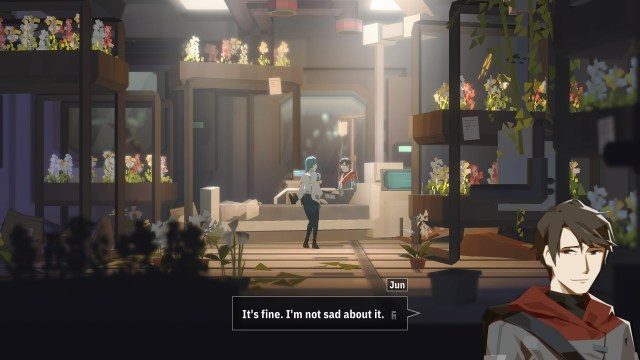
The story is told decades in the future from the perspective of Jun, so at least he’s safe by the narrative’s end. But, otherwise, the pieces can fall in a multitude of ways, and it’s down to you to watch – near helplessly – as they do. Events take place over seven chapters and ten hours or so – dependent, largely, on how much you dive into the Mass Effect 2 starmaps – and you will be put through the wringer, one or two times, just to make sure.
So much of OPUS: Echo of Starsong – Full Bloom Edition near-perfection comes from these characters. The relationship between Jun and Eda is so adorably chaste and tentative, and the rest of the cast grate initially but then become favourites by the time curtains drop. Equally, the world-building is superlative: if you wanted to construct a Silmarillion-like text to summarise all of the factions and their histories, you absolutely could.
Weirdly enough, though, our favourite moments were in the exploration. OPUS: Echo of Starsong – Full Bloom Edition’s star navigation feels like a board game at moments, as you pull a card from the event deck and wonder whether it will leave you with enough fuel or shields to make the journey home. Learning this board game, mastering it and then cleaning up the systems that remain unexplored, was a constant highlight. We found ourselves immediately returning to older chapters after the credits rolled, just so we could see every visitable location.
There are a few flaws here and there. That event deck we mentioned can lead to immediate and sudden death, often thanks to a poor dice roll. The arbitrary nature of these moments threaten to infuriate, until Jun from the future waves his magic wand, saying “it didn’t happen that way”, returning us to the moments before that death. We’d have rathered a harsh punishment and the opportunity to redeem ourselves. But we couldn’t stay mad at OPUS: Echo of Starsong – Full Bloom Edition for long.
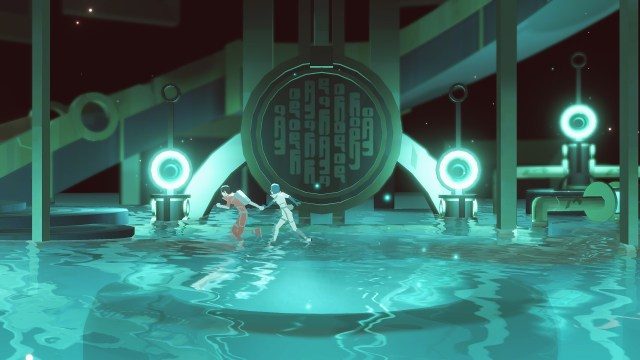
We’re still thinking about OPUS: Echo of Starsong – Full Bloom Edition. It’s a game that dares to be many things at once – a visual novel, a space exploration sim and a tomb-raiding adventure – and then, even more audaciously, manages to master them all. But, most of all, it’s a story that is as operatic and tearjerking as the name implies. We were completely and utterly in its net.
What unites the characters is a need for one final moment with the person they love. At the end, we felt their pain: we needed more time with OPUS: Echo of Starsong – Full Bloom Edition.
You can buy OPUS: Echo of Starsong – Full Bloom Edition from the Xbox Store
TXH Score
5/5
Pros:
- Beautiful anime-like animation and characters
- Extremely detailed worldbuilding
- Has you blubbing by the end
- Completely engaging starmap gameplay
- Stellar writing
Cons:
- Opts for some dodgy randomness
Info:
- Massive thanks for the free copy of the game go to – Purchased by TXH
- Formats – Xbox Series X|S, Xbox One, PC
- Version reviewed – Xbox Series X
- Release date – 25 August 2022
- Launch price from – £20.99
- 5/5 Review
- amazon prime gaming
- axie infinity
- Casino Games
- coingenius
- EA Sports
- Evil Geniuses
- Gaming
- gaming headset
- gaming pc
- madden nfl
- Nintendo
- Online casino games
- OPUS: Echo of Starsong - Full Bloom Edition
- pc games
- plato
- plato ai
- plato data intelligence
- plato game
- plato gaming
- platodata
- playstation
- prime gaming
- Reviews
- Team SoloMid
- The Xbox Hub
- xbox
- Xbox Series X
- Xbox Series X Reviews
- zephyrnet
